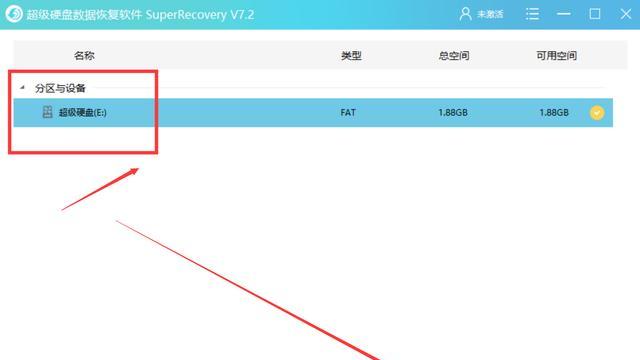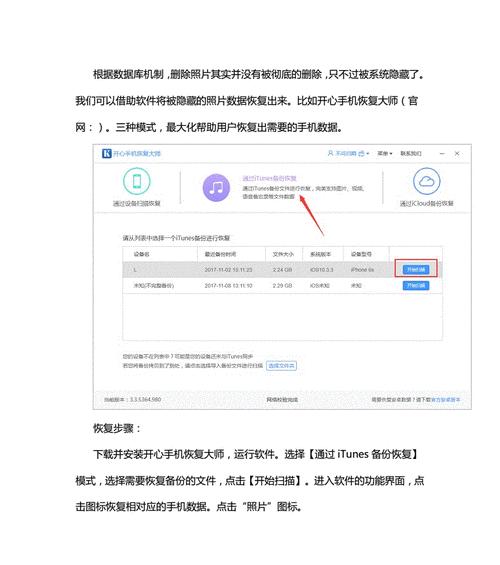 Mobile Tutorial
Mobile Tutorial
 Android Phone
Android Phone
 How to recover accidentally deleted photos? (Detailed tutorial teaches you how to easily retrieve precious photos)
How to recover accidentally deleted photos? (Detailed tutorial teaches you how to easily retrieve precious photos)
How to recover accidentally deleted photos? (Detailed tutorial teaches you how to easily retrieve precious photos)
php editor Yuzai brings you a detailed tutorial to teach you how to easily retrieve precious photos that have been accidentally deleted. We have all accidentally deleted some important photos, but don't worry, there are many ways to help us recover these photos. In this tutorial, we'll introduce several common methods, including using computer software, mobile apps, and cloud services. Whether you are using Windows, Mac, Android, or iOS, you can find a method that suits you. Follow our tutorial and you will easily recover your precious photos that you accidentally deleted!

1. Understand the principles and methods of accidentally deleted photo recovery
Including trash can recovery, this section introduces the basic principles and methods of accidentally deleted photo recovery. Backup recovery and professional data recovery software, etc.
2. Use the trash can to recover deleted photos
Search for target photos and restore them. This section introduces how to use the trash can function of your mobile phone or computer to recover deleted photos, including Open the trash can.

3. Use cloud backup to retrieve accidentally deleted photos
Includes logging in to the cloud backup account, searching for and downloading photos, etc. This section introduces how to use Cloud backup service to recover accidentally deleted photos.
4. Use the photo recovery function that comes with the mobile phone system
Enter the recycle bin or deleted folders and other steps. This section introduces how to use the photo recovery function that comes with the mobile phone system to find Restore accidentally deleted photos, including opening the photo album app.
5. Try to use third-party data recovery software
Connect your phone or camera to your computer. This section introduces how to use third-party data recovery software to recover accidentally deleted photos, including choosing trustworthy ones. software, scan and recover photos, and more.

6. Restore accidentally deleted photos through iTunes or iCloud
Including connecting the device to the computer, this section introduces how to use iTunes or iCloud backup to restore accidentally deleted photos. Deleted photos, choose recovery method and other steps.
7. Use professional data recovery services to recover photos
Including choosing a trustworthy service provider. This section introduces how to seek professional data recovery services to recover accidentally deleted photos and submit the device. Wait for steps.
8. Operate carefully to avoid data loss caused by secondary deletion
To avoid misoperation leading to secondary deletion, thereby further losing data, this section introduces the need to be careful during the process of recovering photos.
9. Pay attention to saving and backing up photos to prevent accidental deletion again
To avoid accidental deletion leading to data loss again, users are reminded to pay attention to saving and backing up photos. This section introduces the steps after restoring photos. importance.
10. Common methods and techniques to avoid accidentally deleting photos
Including setting deletion reminders, this section introduces some common methods and techniques to avoid accidentally deleting photos, organizing photos regularly, and using special photo Management software, etc.
11. How to prevent cell phone viruses from causing photo loss
Recommendations such as not downloading unfamiliar applications at will, including installing anti-virus software. This section introduces how to prevent cell phone virus attacks from causing photo loss.
12. The importance and methods of backing up photos
And introduces several methods of backing up photos. This section introduces the importance of backing up photos, such as using cloud services, external storage devices, etc.
13. Handle other situations that may lead to photo loss
such as formatted devices, hardware failures, etc., and provide corresponding solutions. This section introduces other situations that may cause photo loss.
14. Frequently Asked Questions
How long does the recovery process take? This section answers common questions from readers, such as whether recovering photos will cause data loss.
15.
Emphasizes the importance of recovering accidentally deleted photos in a timely manner. This paragraph describes the full text and encourages readers to take appropriate measures to protect their own photo data.
The above is the detailed content of How to recover accidentally deleted photos? (Detailed tutorial teaches you how to easily retrieve precious photos). For more information, please follow other related articles on the PHP Chinese website!

Hot AI Tools

Undresser.AI Undress
AI-powered app for creating realistic nude photos

AI Clothes Remover
Online AI tool for removing clothes from photos.

Undress AI Tool
Undress images for free

Clothoff.io
AI clothes remover

Video Face Swap
Swap faces in any video effortlessly with our completely free AI face swap tool!

Hot Article

Hot Tools

Notepad++7.3.1
Easy-to-use and free code editor

SublimeText3 Chinese version
Chinese version, very easy to use

Zend Studio 13.0.1
Powerful PHP integrated development environment

Dreamweaver CS6
Visual web development tools

SublimeText3 Mac version
God-level code editing software (SublimeText3)

Hot Topics
 How to use sql datetime
Apr 09, 2025 pm 06:09 PM
How to use sql datetime
Apr 09, 2025 pm 06:09 PM
The DATETIME data type is used to store high-precision date and time information, ranging from 0001-01-01 00:00:00 to 9999-12-31 23:59:59.99999999, and the syntax is DATETIME(precision), where precision specifies the accuracy after the decimal point (0-7), and the default is 3. It supports sorting, calculation, and time zone conversion functions, but needs to be aware of potential issues when converting precision, range and time zones.
 How to create oracle database How to create oracle database
Apr 11, 2025 pm 02:36 PM
How to create oracle database How to create oracle database
Apr 11, 2025 pm 02:36 PM
To create an Oracle database, the common method is to use the dbca graphical tool. The steps are as follows: 1. Use the dbca tool to set the dbName to specify the database name; 2. Set sysPassword and systemPassword to strong passwords; 3. Set characterSet and nationalCharacterSet to AL32UTF8; 4. Set memorySize and tablespaceSize to adjust according to actual needs; 5. Specify the logFile path. Advanced methods are created manually using SQL commands, but are more complex and prone to errors. Pay attention to password strength, character set selection, tablespace size and memory
 How to delete all data from oracle
Apr 11, 2025 pm 08:36 PM
How to delete all data from oracle
Apr 11, 2025 pm 08:36 PM
Deleting all data in Oracle requires the following steps: 1. Establish a connection; 2. Disable foreign key constraints; 3. Delete table data; 4. Submit transactions; 5. Enable foreign key constraints (optional). Be sure to back up the database before execution to prevent data loss.
 How to update the image of docker
Apr 15, 2025 pm 12:03 PM
How to update the image of docker
Apr 15, 2025 pm 12:03 PM
The steps to update a Docker image are as follows: Pull the latest image tag New image Delete the old image for a specific tag (optional) Restart the container (if needed)
 What are the oracle11g database migration tools?
Apr 11, 2025 pm 03:36 PM
What are the oracle11g database migration tools?
Apr 11, 2025 pm 03:36 PM
How to choose Oracle 11g migration tool? Determine the migration target and determine the tool requirements. Mainstream tool classification: Oracle's own tools (expdp/impdp) third-party tools (GoldenGate, DataStage) cloud platform services (such as AWS, Azure) to select tools that are suitable for project size and complexity. FAQs and Debugging: Network Problems Permissions Data Consistency Issues Insufficient Space Optimization and Best Practices: Parallel Processing Data Compression Incremental Migration Test
 How to add columns in PostgreSQL?
Apr 09, 2025 pm 12:36 PM
How to add columns in PostgreSQL?
Apr 09, 2025 pm 12:36 PM
PostgreSQL The method to add columns is to use the ALTER TABLE command and consider the following details: Data type: Select the type that is suitable for the new column to store data, such as INT or VARCHAR. Default: Specify the default value of the new column through the DEFAULT keyword, avoiding the value of NULL. Constraints: Add NOT NULL, UNIQUE, or CHECK constraints as needed. Concurrent operations: Use transactions or other concurrency control mechanisms to handle lock conflicts when adding columns.
 Centos stops maintenance 2024
Apr 14, 2025 pm 08:39 PM
Centos stops maintenance 2024
Apr 14, 2025 pm 08:39 PM
CentOS will be shut down in 2024 because its upstream distribution, RHEL 8, has been shut down. This shutdown will affect the CentOS 8 system, preventing it from continuing to receive updates. Users should plan for migration, and recommended options include CentOS Stream, AlmaLinux, and Rocky Linux to keep the system safe and stable.
 How to clean all data with redis
Apr 10, 2025 pm 05:06 PM
How to clean all data with redis
Apr 10, 2025 pm 05:06 PM
How to clean all Redis data: Redis 2.8 and later: The FLUSHALL command deletes all key-value pairs. Redis 2.6 and earlier: Use the DEL command to delete keys one by one or use the Redis client to delete methods. Alternative: Restart the Redis service (use with caution), or use the Redis client (such as flushall() or flushdb()).





